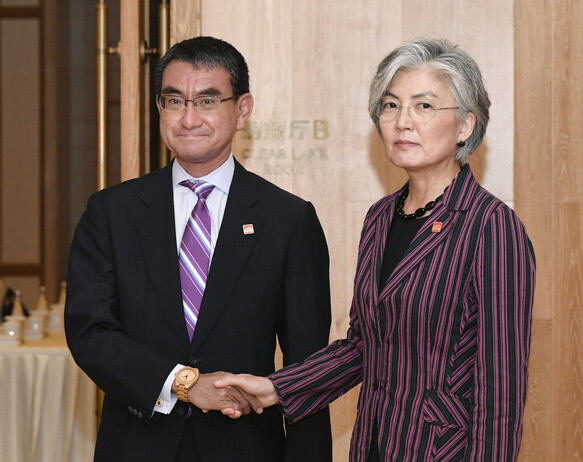hankyoreh
Links to other country sites 다른 나라 사이트 링크
[Editorial] As the instigator of the conflict, Japan needs to be proactive about finding solutions

The top diplomats from South Korea and Japan met on Aug. 21 and shared their opinions about the two countries’ ongoing conflict, but they were only able to confirm their disagreement, and the meeting concluded without achieving anything. Admittedly, there was little chance that the huge gap between the two countries could be bridged in a couple of meetings, but in light of the gravity of the situation, it’s unfortunate that no progress was made toward improving bilateral relations. Even so, it does seem significant that they agreed to maintain diplomatic channels of dialogue moving forward.
During the meeting on Wednesday, South Korean Foreign Minister Kang Kyung-wha expressed her regret for the Japanese cabinet’s decision to remove South Korea from its white list of trusted trading partners on Aug. 2 and strongly called for Japan to retract that measure. Her Japanese counterpart, Taro Kono, reportedly responded by reiterating Japan’s basic position on the matter. This effectively confirmed that neither of the two sides have budged a single inch in the conflict that was triggered by Japan slapping export controls on semiconductor materials bound for South Korea on July 4.
The Japanese government rejects the South Korean Supreme Court’s ruling that the victims of forced labor during the Japanese colonial occupation must be paid compensation, on the grounds that all such matters were resolved by a 1965 agreement with South Korea that settled outstanding claims. But that’s only one side of the story. The Supreme Court found that the damage inflicted by forced labor couldn’t have been resolved by a claims agreement that settled property-based creditor-debtor relationships. That ruling corresponds to international human rights standards that recommend proactive efforts to provide relief to victims of crimes against humanity.
The current row between the two countries was instigated by the Japanese government’s decision to retaliate against the Supreme Court’s ruling. Since Japan started the conflict, it obviously should be proactive about finding a solution, instead of trying to shift all the responsibility to the South Korean government. Seoul has already suggested finding a solution through dialogue and negotiations. On Wednesday, Blue House Policy Chief Kim Sang-jo reaffirmed the government’s desire to deal with this issue diplomatically. “South Korea has proposed the ‘one plus one’ idea [South Korean and Japanese corporations setting up a joint fund], but that’s not the only option. We’re ready to discuss this issue diplomatically with Japan,” Kim said. Tokyo needs to take Seoul up on that offer.
During the meeting, Kono expressed his hope that South Korea would renew its information-sharing agreement with Japan, called the General Security of Military Information Agreement (GSOMIA). Seoul was already on the verge of making its final decision about whether the agreement should be extended, with news reports suggesting that the Blue House might make the announcement as early as Aug. 22. But when Japan is refusing to give an inch on the issue of the export controls, serious questions must be asked about whether there’s any reason to renew the agreement. For a crisis to be averted, Japan must adopt a forward-looking attitude.
Please direct comments or questions to [english@hani.co.kr]
Editorial・opinion
![[Editorial] Penalties for airing allegations against Korea’s first lady endanger free press [Editorial] Penalties for airing allegations against Korea’s first lady endanger free press](https://flexible.img.hani.co.kr/flexible/normal/500/300/imgdb/original/2024/0502/1817146398095106.jpg) [Editorial] Penalties for airing allegations against Korea’s first lady endanger free press
[Editorial] Penalties for airing allegations against Korea’s first lady endanger free press![[Editorial] Yoon must halt procurement of SM-3 interceptor missiles [Editorial] Yoon must halt procurement of SM-3 interceptor missiles](https://flexible.img.hani.co.kr/flexible/normal/500/300/imgdb/child/2024/0501/17145495551605_1717145495195344.jpg) [Editorial] Yoon must halt procurement of SM-3 interceptor missiles
[Editorial] Yoon must halt procurement of SM-3 interceptor missiles- [Guest essay] Maybe Korea’s rapid population decline is an opportunity, not a crisis
- [Column] Can Yoon steer diplomacy with Russia, China back on track?
- [Column] Season 2 of special prosecutor probe may be coming to Korea soon
- [Column] Park Geun-hye déjà vu in Yoon Suk-yeol
- [Editorial] New weight of N. Korea’s nuclear threats makes dialogue all the more urgent
- [Guest essay] The real reason Korea’s new right wants to dub Rhee a founding father
- [Column] ‘Choson’: Is it time we start referring to N. Korea in its own terms?
- [Editorial] Japan’s rewriting of history with Korea has gone too far
Most viewed articles
- 160% of young Koreans see no need to have kids after marriage
- 2[Editorial] Japan’s rewriting of history with Korea has gone too far
- 3Vietnamese war victims speak of sexual violence by S. Korean troops for the first time
- 4For survivor, Jeju April 3 massacre is a living reality, not dead history
- 5[Column] Park Geun-hye déjà vu in Yoon Suk-yeol
- 6[Reporter’s notebook] In Min’s world, she’s the artist — and NewJeans is her art
- 7[Editorial] Penalties for airing allegations against Korea’s first lady endanger free press
- 8Presidential office warns of veto in response to opposition passing special counsel probe act
- 9Hybe-Ador dispute shines light on pervasive issues behind K-pop’s tidy facade
- 10[Special Feature Series: April 3 Jeju Uprising, Part III] US culpability for the bloodshed on Jeju I